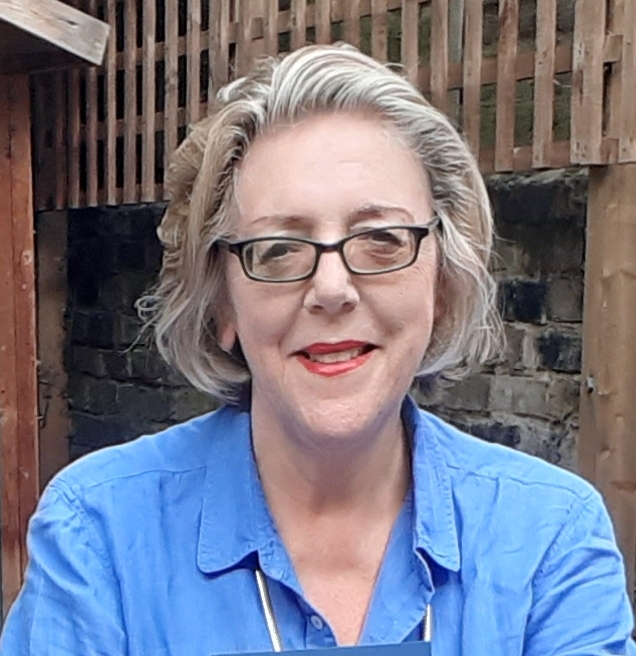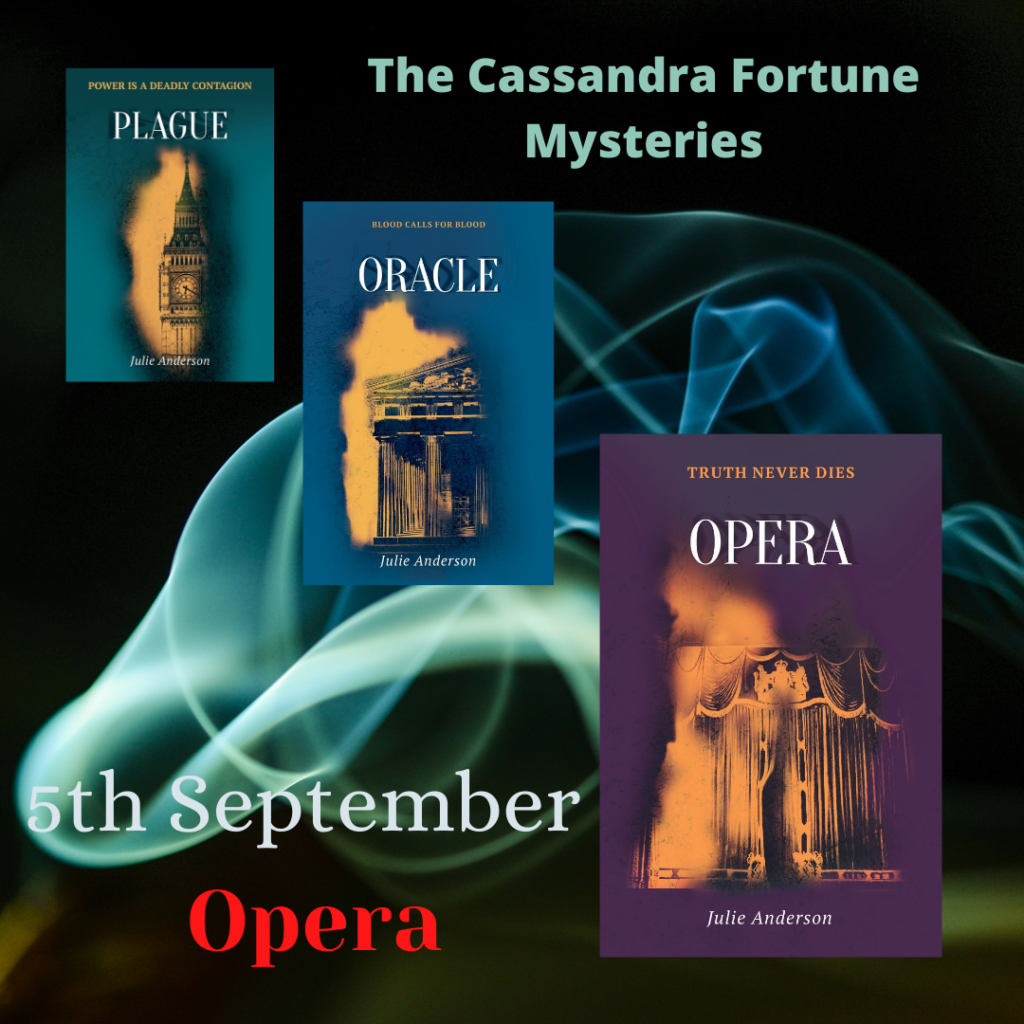

1. How long did it take you to write your latest book?
My latest book is ‘Opera’, published on 5th September by Claret Press. It’s the third in the Cassandra Fortune series and, because many of the characters and part of the plot carried over from previous books, it was probably the quickest to write. From initial idea to final edit took just less than a year.
2. How long does it usually take you to write a book?
It varies quite a lot. So, for ‘Plague’ the first in the Cassandra Fortune series ( and the first time I’d ever written a ‘crime’ book ) it took me about twenty months from idea to final edit and there was a lot of rewriting involved. ‘Oracle’, the second in the series, took about thirteen months.
3. How many hours a day do you write?
When I am getting the first draft on paper I sometimes write for up to ten hours a day – this is when the ideas form, often early in the morning, I find. I go away to do that, when I’m at home in London I can’t work so freely, as I have a husband and a life to manage too. Then, once the first draft is written and I’m re-writing or editing, I’m very disciplined and work 7 – 8 hours a day, from 10 until 5.30 or 6 o’clock.
4. Where do you get your information or ideas for your books and how much research do you need to do?
The Cassandra Fortune series is set in Whitehall and Westminster and I had used to be a senior civil servant, so Cassie’s world is one I know well. I worked in various departments and agencies over a long career, so I’ve picked up a lot of knowledge about how government works. I’m interested in history, so I learned all about the physical layers of London and the various historic elements of SW1, including the Palace of Westminster. There are also people I met during my career who help with some aspects and there are ‘experts’ whom I consult, like a retired policeman friend, to advise on specific details. Nonetheless, I still do quite a lot of research, for example, into London’s underground rivers for ‘Plague’, into the Temple of Apollo at Delphi for ‘Oracle’ and, in the case of ‘Opera’ about the history of that part of the world around the Khyber, the border between Afghanistan and Pakistan (although the story is set in London, what happened in that border region informs the action).
5. Have you ever travelled as research for your book?
I wish I had. I did attend a multi-national conference at the conference centre just outside Delphi, Greece, many years ago, when I was a civil servant. This gave me the idea of setting the second book ‘Oracle’ there. Most of the action of the Cassandra Fortune books takes place in London and I do try to visit each location. So, for ‘Opera’ for example, I had a lovely day walking through Brompton Garden Cemetery and its catacombs, a part of London I’d never visited until then. And I went to Duck Island Cottage, the Swiss-style chalet to be found in St James’s Park, somewhere I’d walked past more times than I can remember, but which I’d never been inside. The Royal Opera House I had visited before and the Royal Horticultural Halls in Vincent Square, but writing ‘Opera’ was an excuse to visit again – up-dating my knowledge.
6. How long have you been writing or when did you start?
I’ve always written stories, going back to my schooldays. Even when I was working in salaried employment full-time, I wrote episodic tales for family and friends (specifically, my god-children). Years later, these became two adventure novels, ‘Reconquista’ and ‘The Silver Rings’ set in thirteenth century Al Andalus in the south of what is now Spain. As a civil servant I also had to write a lot, usually briefing notes for politicians. There are journalists who will say that some of my Press Releases were fiction.
7. How many books have you written? Which is your favourite?
I’ve written five full-length novels now, as well as a book of connected short stories. I like all of them, for different reasons, though the one I worked on last is always my favourite. One gets better at writing the more one does it.
8. Have you ever killed off a character your readers loved?
Yes. Without giving anything away, one of the main characters in ‘Plague’, the first Cassandra Fortune book, was killed at the behest of the villain. There are readers who still haven’t forgiven me (the character was certainly ongoing hero material) and some reviews said that. It was, however, necessary and, I hope, readers now understand that.
9. If you’re planning a sequel, can you share a tiny bit about your plans for it?
Claret Press has asked me to write another in the Cassandra Fortune series and I’m already working out some ideas for it. It will take place about six years after the end of ‘Opera’ and will be, amongst other things, a ‘locked room’ mystery. Many of the characters already familiar to readers will appear again, as well as some new ones, mostly scientists, because it will be set at a synchrotron, a particle accelerator. I’m already doing lots of research into that.
10. What book (or books) are you currently reading?
I’ve just finished reading Abir Mukherjee’s Wyndham and Bannerjee series, set, mainly, in 1920s Bengal. I’ve enjoyed them tremendously, they contain so much history s well as cracking good crime drama and the characters are very endearing. Abir is appearing at this year’s Clapham Book Festival, of which I’m one of the Trustees and I’ll be interviewing him about these books and crime fiction in general. It’s main Showcase Day is on 15th October at the Omnibus Theatre, Clapham. More details can be found at www.claphambookfestival.com.
11. What books helped you the most when you were writing your (first) book?
My first book was a collection of short stories, but when I began writing full length novels I found a couple of books particularly useful. ‘Into the Woods’ by John York, the man behind the BBC’s Writing Academy, made me much more disciplined about my plots and I regularly use his ideas when writing, even though they are actually about writing for the screen. ‘Story’ by Robert McKee is another really helpful book. McGee wrote for film and television too, but his book considers the essence of storytelling, from the ancient Greeks to modern Hollywood. It’s very insightful and always stimulates my thinking about what ever I’m working on.